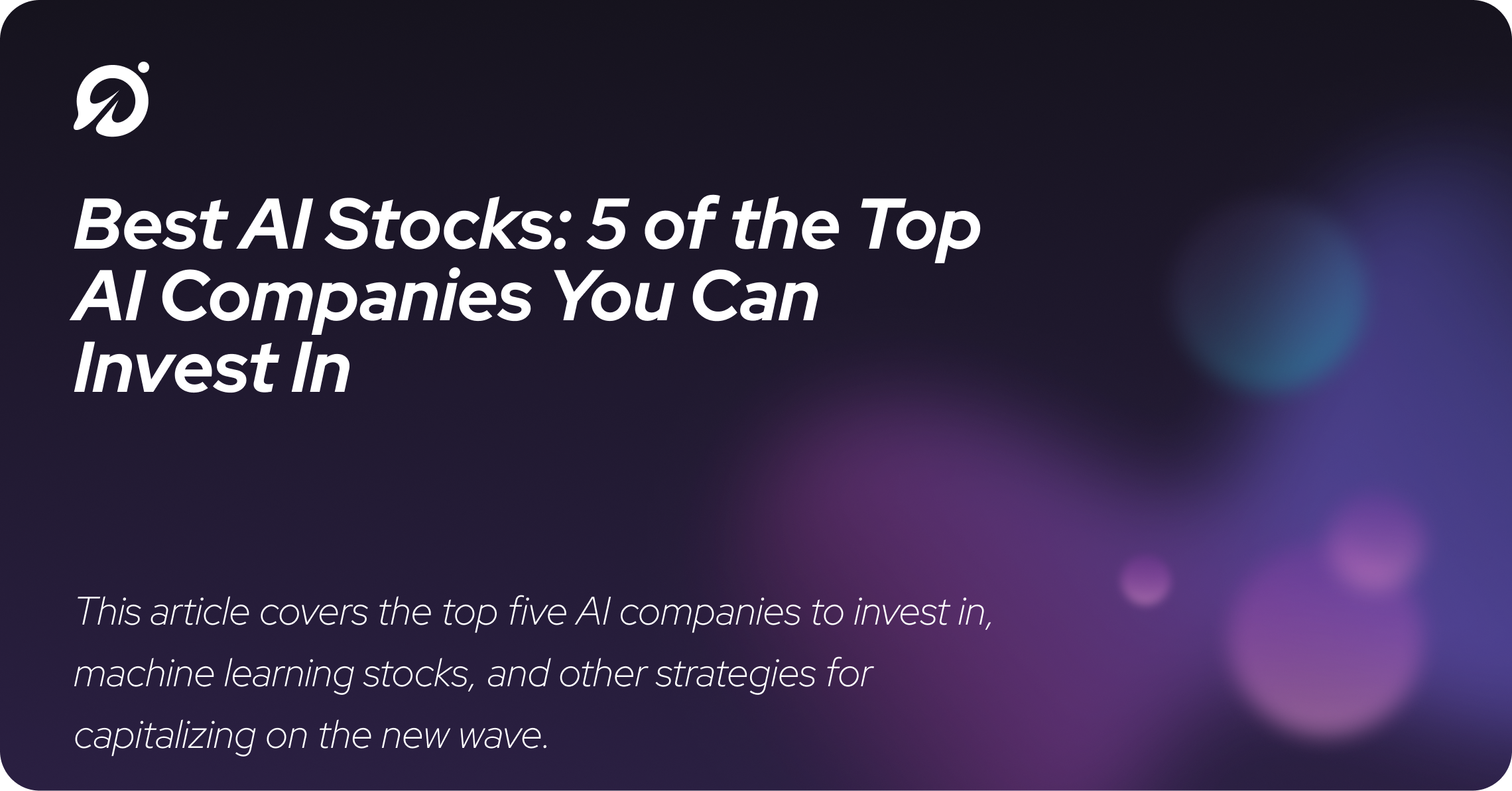Best AI Stocks: 5 of the Top AI Companies You Can Invest In
Artificial intelligence is on the rise, meaning AI companies are, too.

Disclaimer: This is for informational purposes and is not meant to serve as financial or investing advice.
As this new form of technology becomes more prevalent, it’s crucial to stay up to date on the latest innovations and what they have to offer. Today, we’re diving into some of the top AI companies you can invest in and what you need to know.
How Do Companies Use Artificial Intelligence?
Artificial intelligence (AI) is one of history's fastest-growing and transformative industries. Several publicly traded companies are pioneering the technology and investing millions into its development.
AI is an umbrella term that contains many subsets, including machine learning, automation, natural language processing, and visualization tools. You can train machine learning algorithms to detect fraud for financial companies or diagnose cancer for healthcare companies.
Natural language processing is being developed to allow computers and humans to interact more fluidly. A massive opportunity for AI is improving customer service, and AI is being used to enhance chat support and even talk to customers like humans.
Neural networks are like AI brains that use deep learning algorithms to create new drugs, improve traffic flow, and pilot autonomous vehicles.
What Are the Top AI Stocks in 2023?
Many companies are sitting on large amounts of detailed customer and business data that they aren’t fully utilizing, and machine learning will be able to unlock the potential of that data.
Here are the best artificial intelligence stocks to watch:
1. Alphabet Inc. (GOOGL)
Google AI is using AI to solve problems for millions across the globe. A recent Google blog touts a machine-learning initiative in Bangladesh and India that warned 300 million people about upcoming floods.
Google dominates in software and hardware with billions of users. They have arguably the most robust datasets of human behavior. They’re using that data to innovate consumer AI products, enterprise AI, and non-profit use cases.
It can be one of the best stocks, period. However, its forays into developing AI software, such as Bard (the upcoming conversational AI service), also allows Google’s stock to fall into the AI category.
2. Amazon (AMZN)
Amazon is well known as an industry-leading ecommerce marketplace. At its core, Amazon is a tech company that invests resources in emerging technologies.
Amazon Web Services, or AWS, allows anyone to build and deploy an AI model on their cloud computing servers. AMZN stock is an excellent bet on the server space that future AI applications will need to be built.
3. Micron Technology (MU)
Micron Technology is a semiconductor development company. In short, Micron develops memory and storage solutions for computing systems. Their hardware enables accelerated AI training.
AI will need more memory and storage as it improves and gets smarter. Micron is laser-focused on improving semiconductor memory capacity to supercharge the AI technology of the future.
4. IBM (IBM)
IBM is one of the oldest computing companies in the world. Their flagship AI product IBM Watson was one of the first AI products to hit the mainstream when it successfully competed in and won the trivia game show Jeopardy in 2011.
They now offer Watson as an AI customer service solution, AI text-to-speech, and neural network products. IBM has a proven track record in computing, and it's clear they understand AI's potential to change the industry's future.
5. Nvidia (NVDA)
Nvidia provides hardware and software solutions for AI computing. You can use Nvidia GPUs (Graphics Processing Units) to train AI models on vast datasets. Nvidia developed a language called CUDA for training and refining such AI models.
Nvidia currently offers AI business solutions for industries ranging from healthcare to finance. Nvidia has a 17% market share of the GPU market and looks to increase that share by developing advanced AI computing chips.
The Nvidia A100 is their flagship AI product. It’s a $10,000 chip that powers many AI applications at companies like Google and Microsoft. The A100 is a high-performance GPU designed to power machine learning and neural nets.
AI startups need these powerful chips to power their AI applications ranging from chatbots to autonomous vehicles. To reach the computing power necessary to run these apps, startups buy hundreds or thousands of these $10,000 chips.
If Nvidia can keep its early lead in the GPU-powered AI market, it will be a powerful player in the new AI-centric economy.
What Are the Top Machine Learning Stocks?
Machine learning is a subset of artificial intelligence that trains an AI on large datasets. The AI learns patterns and teaches itself to make insights and predictions based on that data.
Machine learning is an important new technology that can harness AI to improve existing business models. These companies are using machine learning to cut costs and increase profitability. These cost-cutting measures could lead to increased shareholder value in dividends.
Here are the machine-learning stocks Wall Street has its eye on:
Alphabet Inc. (GOOGL)
The search engine giant is developing machine learning across every conceivable industry. It has an autonomous transport partnership with Mercedes-Benz, a chatbot that rivals OpenAI’s ChatGPT, and a music machine-learning model that can generate entire songs.
Google makes billions of dollars each year off of ads. It uses machine learning algorithms to improve click-through rates and deliver better ad experiences for users.
Amazon (AMZN)
Amazon is using its AWS engineering talents and machine learning to improve its e-commerce and fulfillment services further. It recently used machine learning to reduce downtime in fulfillment centers by 70%.
Nvidia (NVDA)
Nvidia chips power many machine learning startups. Nvidia’s machine learning ecosystem is designed to help companies improve not just their hardware but their machine learning software as well.
And Nvidia has partnerships with Google Cloud, AWS, and Microsoft Azure to make deployment seamless.
Microsoft Corporation (MSFT)
When you think of machine learning, you may not immediately think of Microsoft. Microsoft is known for its consumer-facing software and operating systems.
But Microsoft’s cloud computing arm, Microsoft Azure, is pioneering machine learning research. They’ve coined it “ML as a service,” which means they are packaging machine learning systems they plug and play into applications.
Microsoft is developing machine learning models that ingest and learn from internet-sized datasets. They can parse the entire internet and use that information to make decisions.
They’ve also developed DeepSpeed, a free, open-source optimization library for machine learning.
What Are the Benefits and Risks of Investing in AI Companies?
One of the problems with investing in AI or any emerging technology is that many of the companies are small, privately-owned startups.
Most tech stocks, from Tesla to Intel to Apple, are probably involved in AI somehow. One way to create an edge is to develop a thesis around how much AI can accelerate the valuation of a company. But it can be challenging to validate that thesis in the short term.
Another drawback is that the AI arms race means companies are incentivized to keep their projects secret until released to maximize shareholder value. You will have to do much research and read between the lines to anticipate AI breakthroughs and profitably trade off them.
Another benefit of investing in AI is that it is a paradigm shift in technology. AI seems to grow even faster than social media in the 2000s. It could transform all aspects of life, even beyond technology.
In short, AI could prove to be a rising tide that lifts all boats. Due to gloomy economic headwinds and market saturation, tech stocks have struggled. AI could be the revolution that reignites these companies and creates a new tech renaissance.
In trading, it’s always important to think through the worst-case scenario. AI is hot right now; with every company doing a press release on AI, the technology could be priced into the market. You shouldn’t go all in on one bet or technology.
Our blog has resources for creating balanced portfolios that help minimize the risk posed by market-wide drawdowns.
What Is an AI ETF?
Are you overwhelmed by the companies and technology in the AI ecosystem? An easier way to bet on the proliferation of AI tech could be investing in an ETF. An ETF (exchange-traded fund) is a basket of securities managed by a brokerage that trades on the stock market under on ticker.
The goal of an ETF is to get the investor exposure to an industry or technology without putting all their eggs in one basket. With an AI ETF, traders can gain exposure to the upside of the technology without having to bet on just one company.
Semiconductor ETFs are a great way to bet on the future of AI. As mentioned earlier, chip manufacturers are a lynchpin of the AI economy. Popular semiconductor ETFs include the VanEck Semiconductor ETF (SMH), iShares Semiconductor ETF (SOXX), and the Invesco Dynamic Semiconductors ETF (PSI).
Remember that ETFs carry small management fees charged by the brokerage that manages them.
The Bottom Line
AI is an exciting new technology that will likely revolutionize how we interact with computers. Startups, tech giants, and everyone in between are looking to monetize it.
As a trader, you can anticipate the AI wave by learning what AI products are being developed and which stock picks will be most profitable.
Of course, hardware has proven time and time again to be a profitable bottleneck when it comes to emerging tech. Companies like Nvidia and Micron are selling shovels in a gold rush. They are fan favorites for investors that are bullish on new tech.
Companies like Google and Microsoft are paving the way for consumer-driven AI applications. Most people will interact with AI using their smartphones. Watching where people are using the new technology is a smart bet.
Amazon and Google have proven that you can use AI and machine learning to improve existing business lines.
There could be more upside in finding struggling or under-the-radar companies that will benefit the most from AI products instead of those developing the technology themselves.
As Amazon has demonstrated, AI can drastically improve logistics. Could distressed retailers use AI to turn the ship around?
If Google can juice its ad dollars using machine learning, can smaller SaaS companies increase profitability using AI products?
To profit from increasingly popular technology, you must think a couple of steps ahead of the market. This thinking, paired with robust technical analysis and trading systems, can help you profit from the AI revolution.
Ready to learn more about trading? Check out the other guides on our Pluto blog to learn more.
Sources:
Artificial Intelligence (AI) vs. Machine Learning | Columbia AI
Our commitment on using AI to accelerate progress on global development goals | Google Blog
PC GPU market share worldwide by vendor 2022 | Statista
Nvidia's A100 is the $10,000 chip powering the race for A.I. | CNBC
How AWS used ML to help Amazon fulfillment centers reduce downtime by 70% | VentureBeat
